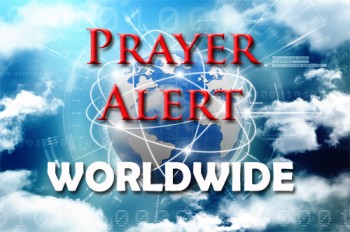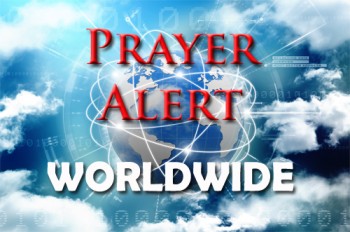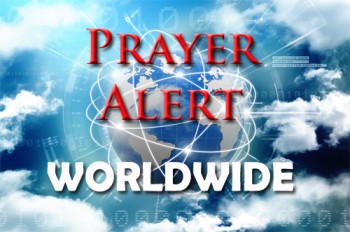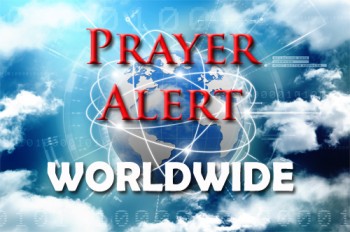Displaying items by tag: Asia
Iran: Christian convert - propaganda charge
Ebrahim’s ordeal began in 2013 when he was sentenced to one year in prison and two years of internal exile in the remote town of Sarbaz for ‘propaganda against the regime by establishing and organising Christian gatherings’ and ‘having contacts with anti-revolutionary networks outside Iran’. He expected to be released in 2015, but instead he was retried and sentenced to an additional five years in prison for ‘acting against national security’. On 27 September, he had to answer a further charge of ‘propaganda against the state’, carrying a prison sentence of three to twelve months. Thankfully, the next day the case closed for lack of evidence. Iranian Christians are thankful that the prosecutor did not press charges, but request prayer that Ebrahim will know the Lord’s peace during this time of increased pressure from the authorities, even while continuing to serve the internal exile sentence.
Yemen: victims 'screaming in pain, but no one is hearing'
‘There are no heroes in Yemen, just criminals and victims’, said a human rights investigator. The victims are millions of ordinary Yemenis caught in a protracted proxy war that brought Yemen to its knees and turned it into the world's biggest humanitarian disaster. The lack of easy access to the country for journalists and international monitors means many Yemenis feel, as one doctor put it, that ‘we are screaming in pain, but no one is hearing’. Recently a Sky investigation team travelled hundreds of miles through armed checkpoints and rough terrain to gather testimonies from the victims, witnesses and survivors. Families in Taiz, Yemen’s third-largest municipality and once a cultural epicentre, have experienced some of the fiercest fighting during the six-year civil war between pro-government troops backed by a Saudi-led coalition (supported by the USA and the UK) and Houthi rebels, supported by Iran. Both sides are guilty of grave human rights abuses: see
Asia: missionaries’ prayer needs
Due to their work being sensitive names of places and people are omitted in this prayer request, but God knows who you mean when you pray. D was in NWB for five months before safely returning to the UK with his family. They are all currently in quarantine and then will enter further training. Please pray for God to prepare a community for them to return to in the mission field. Pray for God to protect their business and the team that they left behind and for visa options to open up for those wishing to join the team. Pray also for God’s guidance as they work out their fundraising plans and for open doors to be revealed so that their ministry grows. Please pray for protection for non-Covid patients and staff, and for enough income to keep going; Ask for wisdom for R, who is unsure when to return to the UK for home assignment, and for any visas that have been delayed by closures in immigration due to Covid.
Armenia/Azerbaijan: South Caucasus war?
The long-simmering conflict between Armenia and Azerbaijan over the Nagorno-Karabakh region erupted on 27 September, with over 100 confirmed deaths already in the fiercest fighting in years. Many are asking, ‘Will it escalate into an all-out war that threatens regional stability and drags in major outside players?’ https://www.bbc.co.uk/news/world-europe-54356336 For years, mainly Christian Armenia and Muslim-majority Azerbaijan have been at odds over the rugged Nagorno-Karabakh highlands. Between 1988 and 1994 the two sides fought a bloody war to control the enclave, which was part of Azerbaijan but mainly populated by ethnic Armenian Christians. The conflict resulted in over 30,000 dead, a million displaced, and a fragile truce that left Nagorno-Karabakh as a de facto independent state, recognised by Armenia but not by most other countries, including Azerbaijan. The recent violence sparked an uproar in Azerbaijan. Thousands took to the streets calling for the army to ‘recapture’ Nagorno-Karabakh.
South China Sea: US actions alarm China
Patches on US uniforms made for military exercises off California’s coast showed an MQ-9 Reaper drone superimposed over a red silhouette of China. Throughout September the US has staged simulated island assault exercises featuring this red silhouette in what China described as a provocative gesture, saying China would fight back if the US attacked them in the South China Sea. US-based Air Force magazine reported that the military training suggested the air force was focusing more on the Pacific region. The drills deployed the Navy’s carrier strike groups, submarines and other vessels and aircraft to the eastern Pacific, plus transport aircraft and special warfare and marine corps personnel. The squadron commander said, ‘It’s a demonstration of our capability to rapidly move the MQ-9 anywhere in the world and then get out, showing its operational reach capabilities.’
Thailand: record-breaking baptism despite Covid
Thailand was the second nation to report coronavirus cases, but now has effectively contained it with countrywide lockdown and continued precautions, now celebrating 100 days without a Covid case. Now a church-planting movement celebrates another milestone that wouldn’t be possible without word of mouth conversations, house gatherings, and in-person testimonies. The Free in Jesus Christ Church Association, a Thai-led movement which focuses on village-level evangelism, held the largest baptism in its history. They baptised 1,435 people in one day; twenty ministers lined up across a waist-deep reservoir waiting for new believers to come one-by-one from the shore to proclaim their faith and be submerged for the sacrament. Bob Craft of Reach a Village ministry said, ‘We believe it is the merciful hand of God to allow the gospel to spread at this crucial time.’
15 rescued from sexual exploitation, five arrested
Praise God for a rescue last week that resulted in the arrest of 5 suspects and the rescue of 15 victims from online sexual exploitation. This rescue was the result of close collaboration between Philippine authorities, Australian law enforcement, and IJM. Pray for the survivors as they receive care and for continued strong collaboration efforts with international law enforcement. Read more on the story here
Taiwan tells China to back off as airspace 'incursions' rise
Taiwan has reported a sharp rise in incursions by Chinese warplanes into its air defence identification zone. Foreign minister Joseph Wu urged Beijing to ‘return to civilised international standards’ after a Chinese foreign ministry spokesman said there was no so-called median line in the Taiwan Strait ‘as Taiwan is an inseparable part of Chinese territory’, to be taken by force if necessary, even though the island has been self-ruled for more than 70 years. Beijing has ratcheted up pressure on the democratic island since the 2016 election of President Tsai who rejects its view that Taiwan is part of ‘one China’. Taiwan accuses China of violating a long-held tacit agreement after China’s fighter jets began crossing the median line of the waters that separate the two sides. Now tension between the two is at its highest in years, with Taiwanese fighter jets scrambling to intercept the Chinese aircraft last week.
Pray for the Philippines
The Philippines have a Christian majority, with a population of over 100 million. 8-10 million Filipinos live abroad, working as nurses, engineers, domestic servants, nannies, casual labourers and sailors. Many are enthusiastic and effective witnesses for Christ, often in countries where Christianity is most restricted or persecuted. Some have suffered greatly for their faith. The Philippines struggle against poverty, injustice, corruption, poor infrastructure, unreformed land laws, tropical storms, and heavy-handed government. A rampant drug trade has evoked the murder of thousands, with victims rarely those responsible for drug trading. The government’s ‘war on drugs’ looks like a war on slum-dwellers - where most victims come from. The Church includes vibrant and charismatic grassroots movements devotedly following Jesus and moving in the Spirit. Their problems are those associated with rapid growth: splits, false teachings, personality cults, and widespread poverty. Pray for continued growth of Christian ministries among the urban poor.
Hong Kong: more arrests ahead of rally
Opposition activist Joshua Wong was arrested over illegal assembly last October and the anti-mask law, which bans people from covering their faces during protests. He spread the news of his arrest via Twitter. Veteran social activist Koo Sze-yiu was also detained in connection with the incident. Referring to a rally planned for National Day, Wong said, ‘The government wants to produce a chilling effect on Hong Kong people in order to frighten people away from the 1 October march. I will continue to resist, and we should also let the world know Hong Kong people will not easily surrender. They can’t censor our commitment to fight for freedom. The chilling effect will not work and is not the way out.’ It is the third time he has been prosecuted since June.









